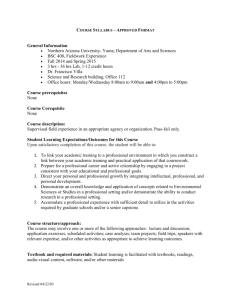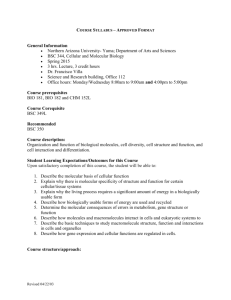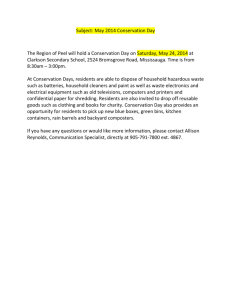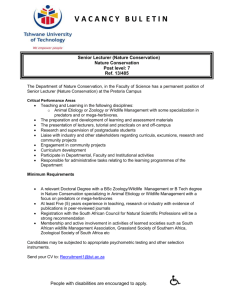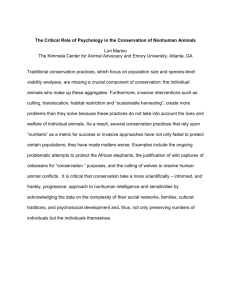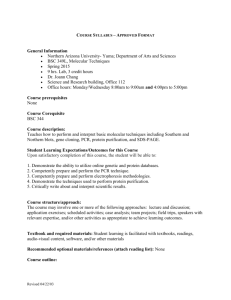BSC 441 Conservation Biology Master Syllabus
advertisement
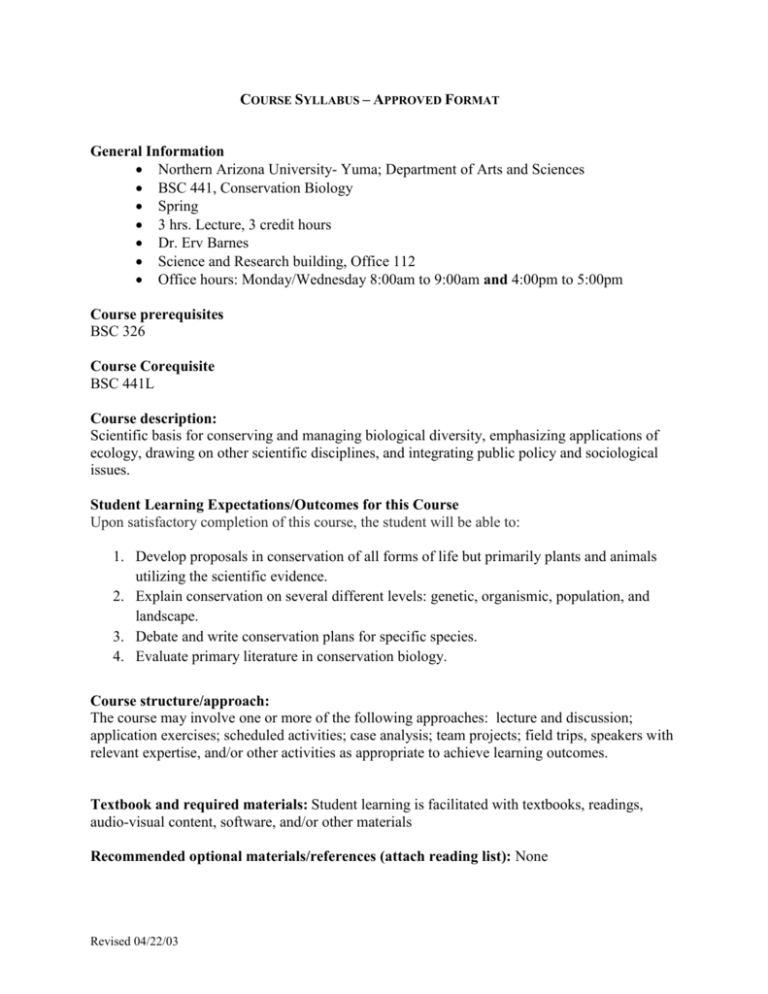
COURSE SYLLABUS – APPROVED FORMAT General Information Northern Arizona University- Yuma; Department of Arts and Sciences BSC 441, Conservation Biology Spring 3 hrs. Lecture, 3 credit hours Dr. Erv Barnes Science and Research building, Office 112 Office hours: Monday/Wednesday 8:00am to 9:00am and 4:00pm to 5:00pm Course prerequisites BSC 326 Course Corequisite BSC 441L Course description: Scientific basis for conserving and managing biological diversity, emphasizing applications of ecology, drawing on other scientific disciplines, and integrating public policy and sociological issues. Student Learning Expectations/Outcomes for this Course Upon satisfactory completion of this course, the student will be able to: 1. Develop proposals in conservation of all forms of life but primarily plants and animals utilizing the scientific evidence. 2. Explain conservation on several different levels: genetic, organismic, population, and landscape. 3. Debate and write conservation plans for specific species. 4. Evaluate primary literature in conservation biology. Course structure/approach: The course may involve one or more of the following approaches: lecture and discussion; application exercises; scheduled activities; case analysis; team projects; field trips, speakers with relevant expertise, and/or other activities as appropriate to achieve learning outcomes. Textbook and required materials: Student learning is facilitated with textbooks, readings, audio-visual content, software, and/or other materials Recommended optional materials/references (attach reading list): None Revised 04/22/03 Course outline: Week 1: Conservation biology and conservation medicine Week 2: Ecological health and change Week 3: Emerging infectious diseases Week 4: Monitoring ecological health Week 5: Global ecological change and human health Week 6: Biodiversity and human health Week 7: Zoonotic infections and conservation medicine Week 8: Zoological parks and endangered species recovery Week 9: Ecotourism, unforeseen effects on health Week 10: Wildlife health and ecosystems Week 11: Conservation medicine and challenges for the future Week 12: Endocrine disruptive compounds in surface water and their effects on wildlife Week 13: Global ecological integrity and public health Week 14: Biodiversity in biomedical research Week 15: Antibiotic resistance and antidepressants in surface water and their effects on wildlife. Week 16: Final Exam and presentations Assessment of Student Learning Outcomes Methods of Assessment: In-class exams, homework, debates, in-class activities, research paper, and/or presentations. Timeline for Assessment: Over the course of the semester Grading System: Letter grades for the course will be determined based on the percentage of the total points as follows: 90-100% A Excellent 80-89% B Good 70-79% C Average 60-69% D Lowest passing <60% F Failure Course policy: Retests/makeup tests: No make-up exams or re-tests except for what the instructor may deem as extenuating circumstances. Attendance Policy: Under NAU Policy, students are expected to attend every session of the class in which they are enrolled. Revised 04/22/03 Statement on plagiarism and cheating: DON’T CHEAT! Please refer to the NAU Student Handbook policy statement on Academic Integrity. Academic honesty does not allow "plagiarism — knowingly representing the words or ideas of another as one's own" (2005, Undergraduate General Academic and Graduation Policies). If your instructor determines that you are guilty of plagiarism he deserves the right to give you a zero on the alleged assignment up to failing the course in question. All incidents regardless will be reported to the university. University policies Attach the Safe Working and Learning Environment, Students with Disabilities, Institutional Review Board, and Academic Integrity policies or reference them on the syllabus. See the following document for policy statements: http://www4.nau.edu/avpaa/UCCPolicy/plcystmt.html. Your instructor reserves the right to make any changes to the course policies, schedule, or any other aspect of the class as he sees fit. Revised 04/22/03
